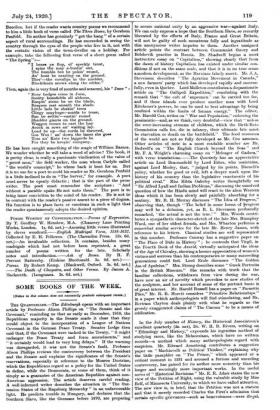In the July number of History, the Historical Association's excellent
quarterly (2s. net), Dr. W. H. R. Rivers, writing on "Ethnology and History," expounds his ingenious method of studying races, like the Melanesians, which have no written records—a method which many anthropologists regard with suspicion. Mr. Edward Armstrong contributes a suggestive paper on "Machiavelli as Political Thinker," explaining why the little pamphlet on "The Prince," which appeared at a critical moment in 1531 and aroused a furious and unending controversy, has gained for its author more notoriety than his longer and seemingly more important works. In the useful series of "Historical Revisions" Mr. E. R. Adair states the new view of the Petition of Right, using the valuable study by Miss Bell, of Minnesota University, to which we have called attention., The new view is, in brief, that the Petition was not a statute and that it merely recorded Charles the First's admission that certain specific grievances—such as benevolences—were illegal.


































 Previous page
Previous page